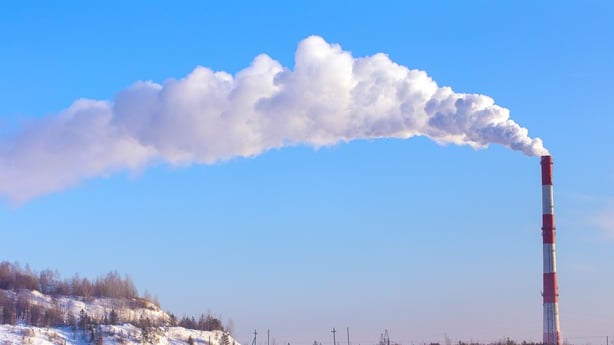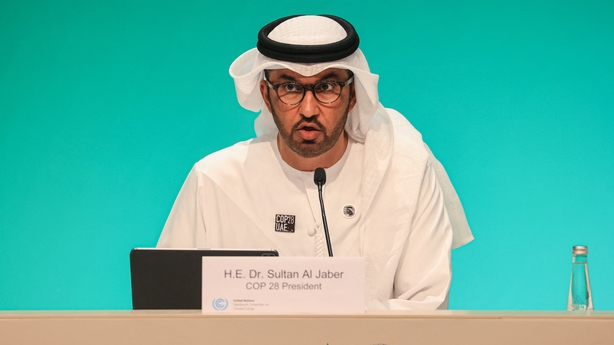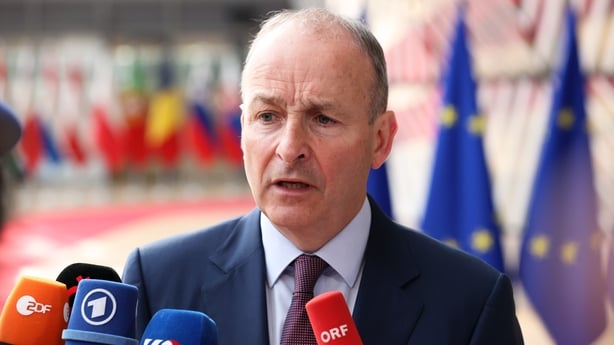Ireland has slipped six places to 43rd out of 63 countries for climate protection, according to a new report published at COP28 in Dubai.
This is the 19th year that the Climate Change Performance Index has been published by Germanwatch, an independent developmental, environmental and human rights organisation.
The report said Ireland remains a low performer and the country's long-term strategy for phasing out emissions is misleading.
It also said the nation’s five-year carbon budgets and sectoral emissions ceilings need to be aligned with the target of reducing emissions by 51% by 2030 and by 100% by 2050.
The report welcomed the country’s medium-term wind and solar renewable energy plans.

However, it criticised the absence of a long-term strategy for phasing out of fossil fuels and measures to shift investment away from natural gas towards an emissions neutral supply.
According to Germanwatch, Denmark is the highest performing country when it came to climate policy with a score of 70.7 compared with Ireland’s score of 51.42.
The next best performing nations in descending order were India, the Netherlands, Morocco and Sweden.
The five worst performers on climate protection in descending order were Russia (31), South Korea (29.98), the United Arab Emirates (24.5), Iran (23.53) and Saudi Arabia (19.39).
Meanwhile, Tánaiste and Minister for Foreign Affairs Micheál Martin is attending the COP28 climate summit in Dubai as the negotiations about global climate action intensify.
Mr Martin will announce €50 million in climate-related finance from Ireland for poorer and less developed countries with half of that money to be delivered between 2025 and 2027.
It includes just over €6 million to support a partnership strategy for small island development.
President of COP28 Dr Sultan Al Jaber has said he wants to see a shift in gears and for the heads of governments to fully engage in ratcheting up their climate action commitments.

Meanwhile, Chair of the Elders Mary Robinson, who had a heated exchange with Dr Al Jabber about science and the need to phase out fossil fuels, is also attending COP28 today.
Mrs Robinson said that COP28 in Dubai is the most important climate summit ever because it is the last COP standing between us and whether we will have a liveable world.
She was speaking at the launch of a new Irish fund to help Small Island Developing States.
Mrs Robinson said the situation with regard to rising greenhouse gas emissions is now so serious that this is a make-or-break COP.
After a day off yesterday the climate talks get back into full swing this morning with Dr Al Jabber urging the delegates to show the world that the multilateral process can deliver a just and equitable energy transition that keeps the goals of limiting global warming to 1.5 degrees in reach.
So far over $83 billion dollars has been committed in global climate finance, including over $700 million to the loss and damage fund to help countries devastated by climate- related disasters.
The new funding announced by the Tánaiste will see Ireland support a wide range of adaptation initiatives in countries most vulnerable to the impacts of climate change.
He said Ireland wants to see tangible and solid results from COP28.
"We need countries to be bolder in terms of their climate mitigation actions," the Tánaiste said.
"We also need countries to step-up and provide additional funding to support the adaptation measures that are urgently needed in countries already on the front line of the climate crisis."

The new funding announced today includes:
- A doubling to €25 million to the International Fund for Agricultural Development that will be contributed between 2025 and 2027).
- €13.75 million for locally-led adaptation initiatives. This will include €2.5 million for the Least Developed Country Fund; €1 million to organisations working to prevent deforestation in the Amazon rainforest and €2 million to the International Federation of the Red Cross and Red Crescent Societies to help build climate resilience in vulnerable countries.
Earlier, the Tánaiste highlighted a number of concrete measures to combat climate change that Ireland has introduced including:
- legally binding emission reduction targets of 51% by 2030
- fixed Sectoral Emissions Ceilings
- and a commitment to becoming climate-neutral by 2050.
He also told Irish business in Dubai that climate change fuels global instability, conflict and forced migration.
Mr Martin said these effects are, very unfairly, felt most acutely by those least responsible for the situation.
"These voices must be heard and listened to," he said.
"COP28 provides this opportunity."








